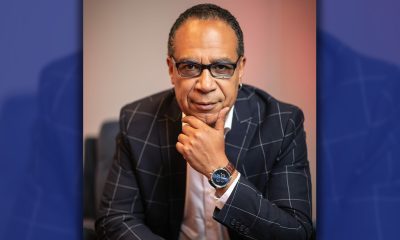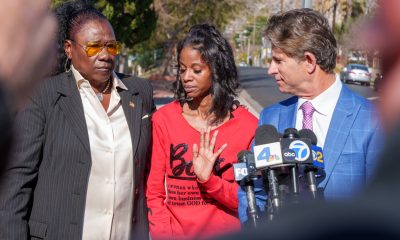Barbara Lee
Black Californians Split on Supreme Court Gun Rights Ruling
Late last week, Gov. Gavin Newsom fired back by signing two pieces of new legislation intended to strengthen the state’s hardline position on possessing firearms in public. He says, together, the bills, AB 1621 and AB 2571, will take on ghost guns and prohibit the gun industry from “advertising to children.”
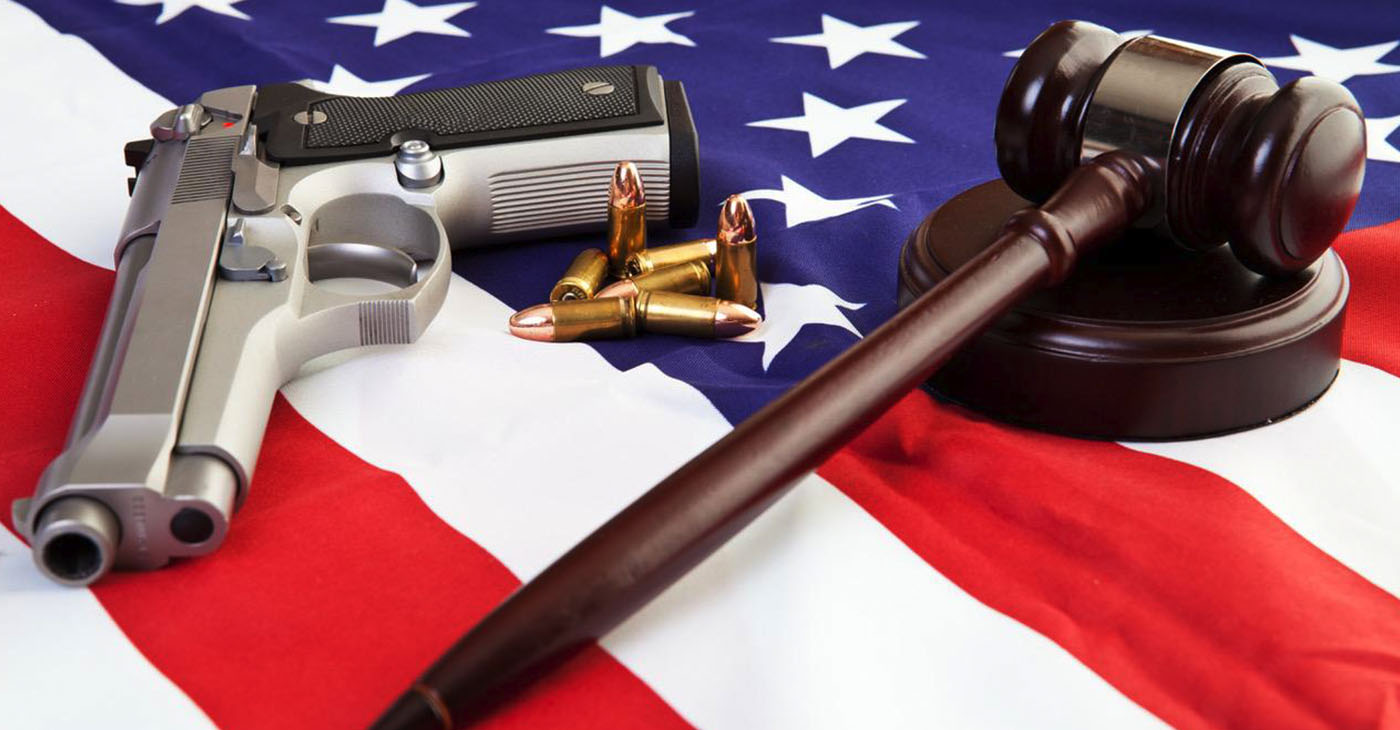
By Tanu Henry, California Black Media
A little over a week ago, the United States Supreme Court (SCOTUS) handed down a 6-to-3 decision making it more difficult for a handful of states – including California – to keep strict laws they have in place against carrying guns in public.
Late last week, Gov. Gavin Newsom fired back by signing two pieces of new legislation intended to strengthen the state’s hardline position on possessing firearms in public. He says, together, the bills, AB 1621 and AB 2571, will take on ghost guns and prohibit the gun industry from “advertising to children.”
“From our schools to our parks to our homes, our kids deserve to be safe – in California, we’re making that a reality. As the Supreme Court rolls back important gun safety protections and states across the country treat gun violence as inevitable, California is doubling down on commonsense gun safety measures that save lives,” said Newsom, who also pointed out that gun violence is the leading cause of death among children.
“The lives of our kids are at stake and we’re putting everything on the table to respond to this crisis,” the governor added.
News about the SCOTUS decision on guns June 23 was drowned out by coverage of the national outrage, and applause, that followed its ruling on Roe. V. Wade the next day.
Reactions nationally to the court’s gun restriction decision – the most significant change to the country’s firearm laws in a decade — were swift, passionate and strong. But the protests and celebrations mostly happened on the sidelines of the country’s more intense reactions to the abortion ruling.
In California, where more than 60% of all adults favor stronger gun laws, elected officials, activists and civil rights leaders have blasted the SCOTUS’ decision.
But not everyone agrees.
Micah Grant is Black, Republican, a father, husband and Natomas School Board member in Sacramento County. He agrees with the SCOTUS’ decision on guns, arguing that the New York law had a built-in racial and class bias.
“I think it’s a fundamentally sound ruling that comes at, obviously, a very sensitive time,” Grant said. “But the laws as they were created two separate classes of people, where in many regions, only the connected and elite could exercise their fundamental right to protection.”
Grant says with crime on the rise in many cities across California, just going outside is “cause enough” to carry a gun.
“The state can simply implement reasonable training requirements to ensure those who apply for permits are knowledgeable, responsible, trained and that they understand the liability that comes with gun ownership,” Grant added.
California is one of five states with gun restrictions on the books, both statewide and municipal, that are affected by the ruling. The others are Maryland, Massachusetts, New Jersey and Hawaii.
SCOTUS Chief Justice John Roberts and Justice Brett Kavanagh said states are still allowed to ban handguns in certain sensitive places like courthouses, statehouses, polling places, etc.
Rep. Karen Bass (D-CA-37) is running for mayor of Los Angeles, a city where the homicide rate has seen a steep 50% increase between 2019 and the end of last year.
“Only 31 days after 19 students and 2 teachers were murdered in one of the most devastating mass shootings in the history of this country, the Supreme Court has responded by striking down a law that was on the books for more than 100 years, making it easier now to carry a weapon in public,” Bass said in response to SCOTUS’ ruling.
Craig DeLuz is Black and Republican like Grant and also the publisher of 2ANews, an online news and opinion outlet focused on gun rights.
“When you have a patchwork of laws from one city to another you don’t know what the regulations are. You are setting someone up to violate the law,” he says.
DeLuz says as Gov. Newsom and state legislators draft new public safety laws to comply with the SCOTUS’ ruling, he hopes they do not violate the Second Amendment of the U.S. Constitution that grants citizens the right to bear arms.
“His lack of knowledge on the issue of firearm policy and firearm technology is evident every time he speaks about it,” DeLuz said, criticizing the governor.
“Gun control laws in the state of California and nationally have been about disarming people of color going back to the 1870s,” he said. “It has been about making it illegal for Native Americans, Chinese Americans, Blacks and other people of color from owning firearms.”
Assemblymember Mike Gipson (D-Carson) has been the strongest voice in the California Legislative Black Caucus calling for strong gun control laws.
“Alarmingly, we are finding that more and more, no region or demographic is exempt from gun violence – our hospitals, grocery stores, schools, and even places of worship, are no longer safe. The proliferation of ghost guns, which are intentionally untraceable weapons to evade law enforcement, has only worsened the issue,” Gipson said.
U.S. Rep. Barbara Lee (D-CA-13) says the current right-leaning Supreme Court has shown a double standard in the way the justices ruled on gun rights and women’s rights to abortion.
“This conservative Supreme Court has ruled that states shouldn’t be trusted to make their own laws on gun control but can keep people from making their own health care decisions. It is unconscionable,” Lee said. “We are seeing the horrific consequences of minority rule playing out in real time—and this is only the beginning of their radical agenda to take America back in history and take another step toward eroding our democracy.”
There is overwhelming support and widespread commitment among elected officials in California for finding ways to strengthen gun laws in the wake of the SCOTUS decision.
In the state budget that Newsom signed last week, lawmakers and the governor’s office agreed to fund $176 million in gun violence prevention grants going to 79 cities and nonprofits.
California Attorney General Rob Bonta announced that he is working with the state Legislature on Senate Bill (SB) 918, to preserve California’s existing concealed carry laws. He reminded residents of the state that “general prohibitions” against carrying firearms in public are still in effect.
“The data is clear, and the consequences are dire — more guns in more places make us less safe. In California, we are committed to passing and defending common-sense, constitutional gun laws that save lives,” Bonta said.
Activism
Barbara Lee Launches Campaign for Mayor of Oakland
“At this critical moment, we must not be a city divided, but a community united,” she Lee. “If elected I will bring my hands-on leadership, new ideas and decades of experience in identifying billions in resources for our great city, so all residents and businesses are stronger and safer and our community has optimism and confidence in Oakland’s future.”

By Post Staff
Barbara Lee on Wednesday morning formally announced her candidacy for Mayor in Oakland’s April 15 special election.
“Time and time again, Oaklanders have faced our toughest obstacles by uniting to meet our challenges,” said Lee.
“At this critical moment, we must not be a city divided but a community united,” she said. “If elected, I will bring my hands-on leadership, new ideas, and decades of experience in identifying billions in resources for our great city so all residents and businesses are stronger and safer and our community has optimism and confidence in Oakland’s future.”
“As Mayor, I’ll address our homelessness crisis, prioritize comprehensive public safety and mental health services, and lead with fiscal responsibility to deliver the core City services residents and business owners deserve. Let’s do this – together.”
“I’ve never shied away from a challenge,” said Lee. “I’m always ready to fight for Oakland.”
Watch her campaign video here, which is online at BarbaraLee4Oakland.com
Activism
Butler, Lee Celebrate Passage of Bill to Honor Congresswoman Shirley Chisholm with Congressional Gold Medal
“Shirley Chisholm lived an honorable life of service and was a trailblazer who opened doors for generations of Black women and opened the imagination of what leadership looked like for our entire nation,” said Butler. “Her extraordinary contributions to American history and progress deserve recognition, and today I am proud to stand with my colleagues in both chambers and on both sides of the aisle to have taken this step to celebrate her legacy, ensuring that future generation of leaders never forget her courage, sacrifice, and patriotism.
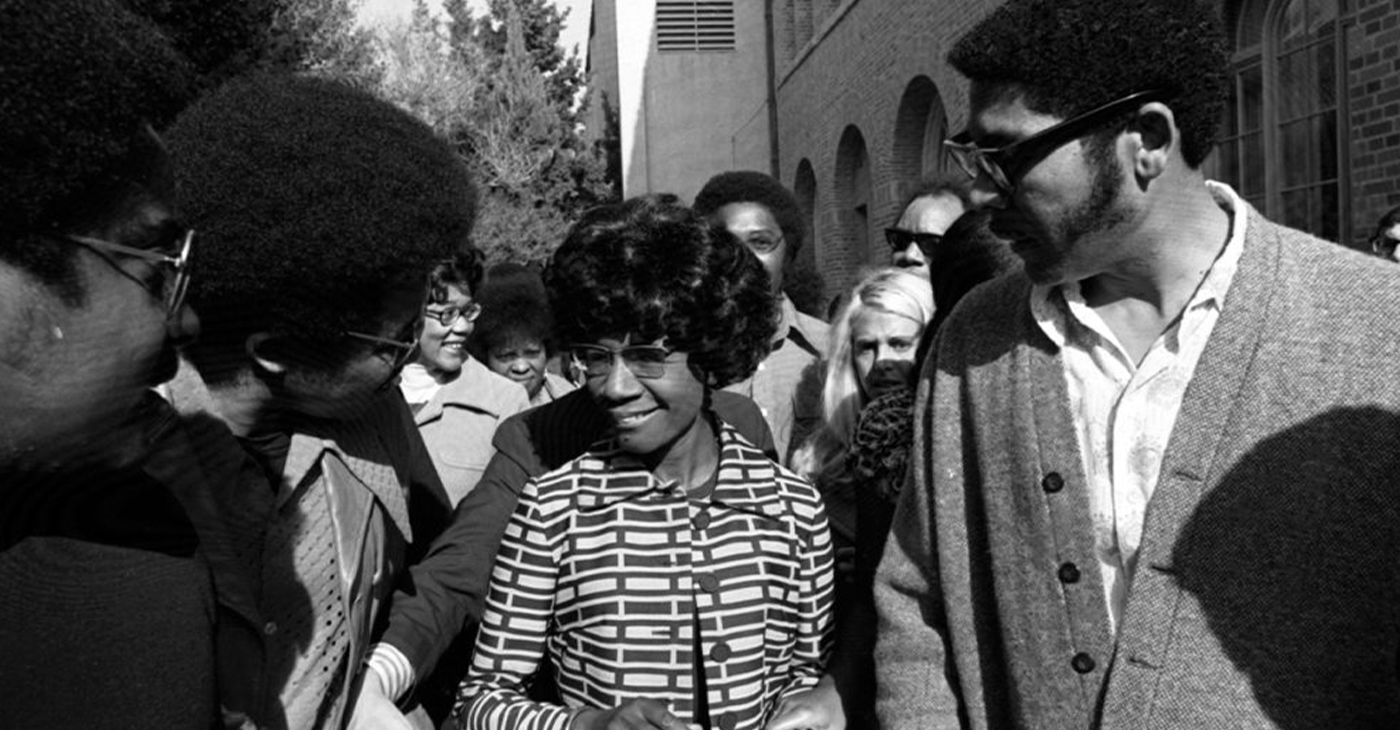
By U.S. Senator Laphonza Butler
Special to The Post
U.S. Senator Laphonza Butler (D-Calif.) and U.S. Representative Barbara Lee (D-Calif.-12) celebrated the passage of bipartisan legislation to honor the life and work of the late Congresswoman Shirley Chisholm, the first Black woman elected to Congress in 1968.
The Shirley Chisholm Congressional Gold Medal Act would instruct Congress to posthumously endow Chisholm with a Congressional Gold Medal – the highest award Congress can bestow – in commemoration of her accomplishments, activism, and legacy.
The Shirley Chisholm Congressional Gold Medal Act was led in the House by Congresswoman Lee, Congressman Byron Donalds, Leader Hakeem Jeffries, Congresswoman Maxine Waters, and Congresswoman Yvette Clarke. The Senate companion to the bill was introduced by Butler and Georgia Senator Raphael Warnock.
“Shirley Chisholm lived an honorable life of service and was a trailblazer who opened doors for generations of Black women and opened the imagination of what leadership looked like for our entire nation,” said Butler. “Her extraordinary contributions to American history and progress deserve recognition, and today I am proud to stand with my colleagues in both chambers and on both sides of the aisle to have taken this step to celebrate her legacy, ensuring that future generation of leaders never forget her courage, sacrifice, and patriotism.
The Congressional Gold Medal serves as the nation’s highest expression of gratitude for distinguished service and achievements, and I see no one more deserving than Shirley Chisholm,” said Lee. “It is critical for the next generation of leaders to see the first Black woman elected to Congress get the recognition that she deserves.
“Congresswoman Chisholm made history as the first Black woman elected to the United States Congress and the first Black woman to run for President of the United States. To Mrs. C, thank you for being unbought and unbossed, for paving the way, and for being a catalyst for change,” Lee said.
During her seven terms in the U.S. House of Representatives, “Fighting Shirley” introduced 50 pieces of legislation and was a champion for racial and gender equity, low-income communities, and the end of the Vietnam War.
In 1972, Chisholm became the first woman and Black candidate to seek the nomination for president of the United States from one of the two major political parties.
After a lifetime of service, Shirley Chisholm died at the age of 80 in Ormond Beach, Florida, on New Year’s Day 2005. Nov. 30, 2024, would have marked Chisholm’s 100th birthday. Chisholm’s motto, “Unbought and Unbossed,” embodies her unwavering advocacy for women and minorities, which defined her remarkable career and inspired future generations of leaders.
After passing the House and Senate with significant bipartisan support, the Shirley Chisholm Congressional Gold Medal Act will head to President Biden’s desk for a signature.
“Congresswoman Shirley Chisholm broke barriers for Black women, Black Americans, and anyone who refuses to be confined by injustice. As an educator, trailblazing public servant, and presidential candidate, she fought for an inclusive democracy that lives up to our nation’s highest ideals of equity and justice under law,” said Warnock. “I am proud to have passed this bill alongside Senator Butler to honor Chisholm’s legacy with a Congressional Gold Medal, and I will continue working to carry on her fight through my work in the Senate.”
“Shirley Chisholm was a pioneering figure in American politics, serving as a source of inspiration for millions throughout our country,” said Senator Susan Collins. “I am proud to join this effort to recognize her historic contributions to our nation.”
“Shirley Chisholm broke barriers as the first African American woman elected to Congress, paving the way for future generations of women leaders,” said Nevada Senator Cortez Masto. “I’m proud I helped pass this bill in the Senate to honor her legacy and continue the fight for representation and opportunity for everyone across the country.”
Barbara Lee
Congresswoman Barbara Lee Reflects on Historic Moment Less Than One Week from Election Day
Congresswoman Barbara Lee (CA-12) today released a piece on Medium reflecting on Vice President Kamala Harris’ historic presidential campaign 50 years after Lee worked on the presidential campaign of Congresswoman Shirley Chisholm.
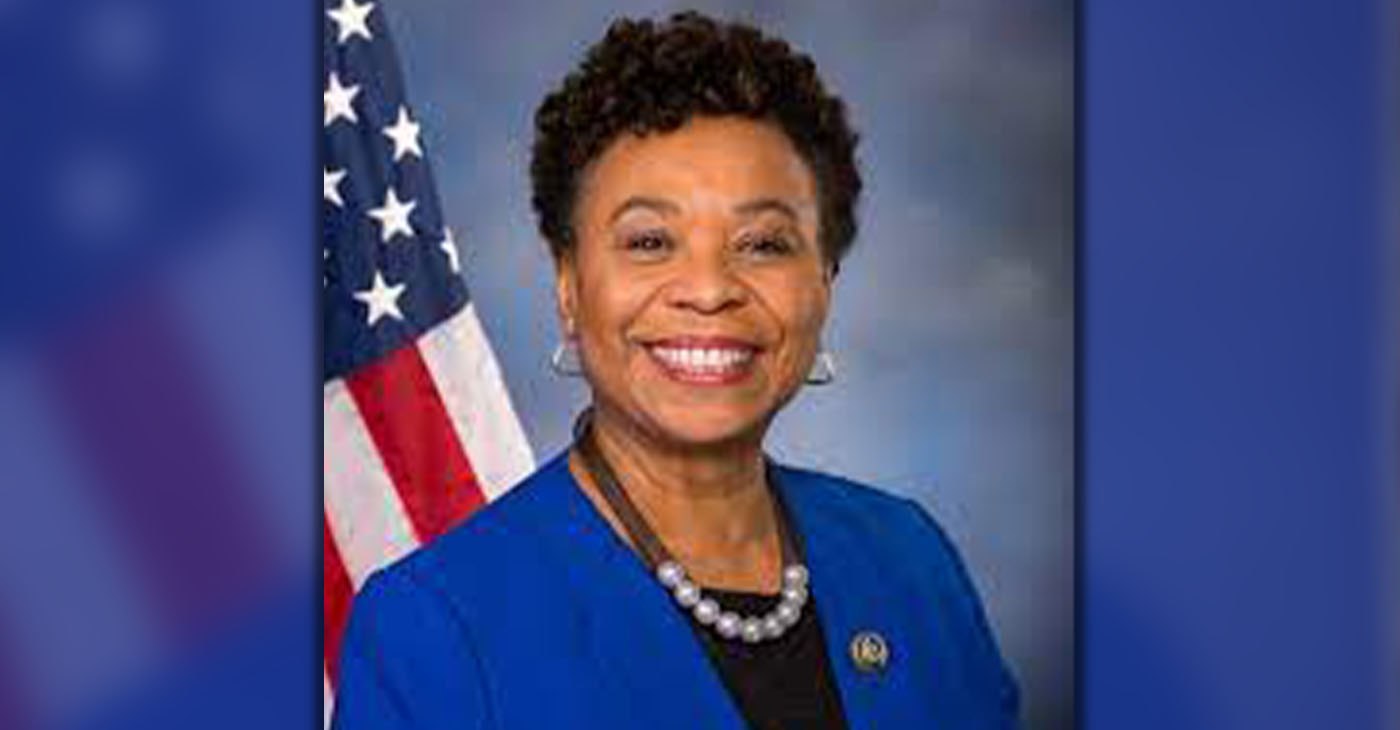
Congresswoman Barbara Lee (CA-12) today released a piece on Medium reflecting on Vice President Kamala Harris’ historic presidential campaign 50 years after Lee worked on the presidential campaign of Congresswoman Shirley Chisholm:
“As Election Day approaches, I’m reflecting on a few dates and numbers that mean something to me.
Zero: the number of Black members in Congress 56 years ago. Next Congress, we hope to swear in over 60 members in the Congressional Black Caucus.
Three: The number of Black women to ever serve in the United States Senate since the first Congress in 1789.
Two: The number of Black women that will be elected to the Senate this year alone if we do our job.
1972: The first time a Black woman, Congresswoman Shirley Chisholm, ran for president in one of the major political parties of the United States.
Zero: the number of Black women to ever serve as president of the United States.
IF we do the work, we can change that with President Kamala Harris.
As I reflect on what would be Congresswoman Chisholm’s 100th birthday next month, I could not help but remember that my first official involvement in U.S. politics was working for her presidential campaign in 1972.
Over 50 years later, I have been involved in every single campaign since. Shirley was my mentor — she was a bold visionary, a progressive woman who understood that working together in coalitions was the only way to make life better for everyone, to build an equitable society and democracy that lived up to the creed of “liberty and justice for all.”
The historic moment we are in today is not lost on me. I have had the privilege to have known Vice President Kamala Harris for over three decades. She, after all, is a daughter of the East Bay. She, like Shirley, truly is a fighter for the people.
And I know she can move our country forward in a new way. As a member of her National Advisory Board, I have campaigned across our country to help take her message, her legacy of service, and her “to-do list,” as she says, to voters who were almost starting to feel hopeless, but are now feeling hopeful once again, captured by the politics joy and the bright possibilities brought upon by a possible Harris-Walz administration.
Recently, I visited churches in North Carolina with members of the Congressional Black Caucus. The chair of our CBC political action committee, Chairman Gregory Meeks from New York’s fifth district, eloquently and powerfully presented a vision of what Dr. Maya Angelou wrote in her famous poem, “And Still I Rise:” “I am the dream and the hope of the slave.”
Meeks remarked that on Jan. 20, 2025, we will observe the birthday of our drum major for justice, Dr. Martin Luther King Jr.
He also described that on Jan. 20, IF we do the work — if we knock on doors, if we make those phone calls, if we spread our message — standing on the podium at the U.S. Capitol will be the first Black speaker of the House of Representatives, Hakeem Jeffries.
In the wings will be over 60 members of the Congressional Black Caucus. Holding Frederick Douglass’ Bible will be the first African American woman appointed to the highest court of the land, Supreme Court Justice Ketanji Brown Jackson.
She will be swearing-in the first Black woman to serve as president, Kamala Harris, in front of the shining white dome of the United States Capitol, built by enslaved Black people.
In front of her and beyond, the tens of millions of Black men and women who voted for her. The world will witness the hope and the dreams of our ancestors ushering in a new way forward.
As I sat in front of the stage this week at the Ellipse in Washington, D.C., as Vice President Harris delivered remarks with the Oval Office behind her, I could not help but feel that our country was ready for this historic moment.
We are not only voting for a Black woman as Commander in Chief of the wealthiest and most powerful country in the world. We are definitively stating that we will not allow the clocks of freedom and justice to be turned back.
We are voting for our ancestors’ hopes and dreams. We are voting for the generations that will come after us, long after we are gone. We are voting for Vice President Kamala Harris.
Let’s get this done.
-

 Activism3 weeks ago
Activism3 weeks agoBooks for Ghana
-

 Arts and Culture4 weeks ago
Arts and Culture4 weeks agoPromise Marks Performs Songs of Etta James in One-Woman Show, “A Sunday Kind of Love” at the Black Repertory Theater in Berkeley
-

 Bay Area3 weeks ago
Bay Area3 weeks agoGlydways Breaking Ground on 14-Acre Demonstration Facility at Hilltop Mall
-

 Activism4 weeks ago
Activism4 weeks ago‘Donald Trump Is Not a God:’ Rep. Bennie Thompson Blasts Trump’s Call to Jail Him
-

 Activism3 weeks ago
Activism3 weeks agoLiving His Legacy: The Late Oscar Wright’s “Village” Vows to Inherit Activist’s Commitment to Education
-

 Arts and Culture3 weeks ago
Arts and Culture3 weeks agoIn ‘Affrilachia: Testimonies,’ Puts Blacks in Appalacia on the Map
-

 Alameda County3 weeks ago
Alameda County3 weeks agoAC Transit Holiday Bus Offering Free Rides Since 1963
-

 #NNPA BlackPress4 weeks ago
#NNPA BlackPress4 weeks agoCalifornia, Districts Try to Recruit and Retain Black Teachers; Advocates Say More Should Be Done





